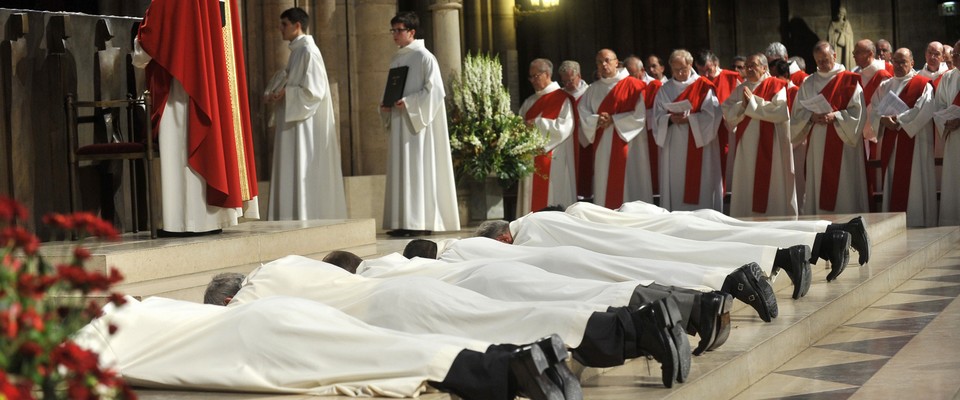Querida Amazonia, the Pope's Exhortation for a Church with an Amazonian Face
Last updated: Thu 31 Mar 2022 PM
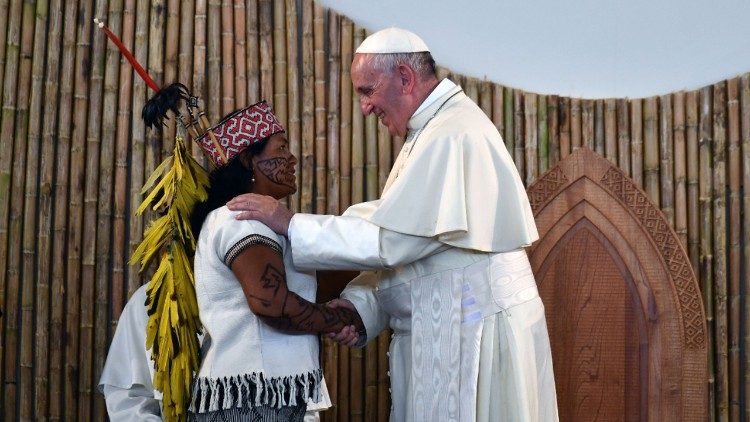
The post-synodal exhortation on the Amazon has been made public. The document traces new ways of evangelization, for the protection of the environment and the salvation of the poor. Francis hopes for a new missionary impulse and encourages the role of the laity in ecclesial communities.
"The beloved Amazon presents itself to the world in all its splendour, drama and mystery". With these words begins the Post-Synodal Apostolic Exhortation, Querida Amazonia. The Supreme Pontiff, in the first points, explains "the meaning of this Exhortation", interspersed with references to the documents of the Episcopal Conferences of the countries of the Amazon, as well as to the poems of authors related to the Amazon. The Pope emphasizes that he wishes to "express the resonances" that the Synod has provoked in him; and specifies that he does not intend to replace or repeat the Final Document, which he invites to be read "in its entirety", hoping that the whole Church will allow herself to be "enriched and questioned" by it and that the Church in Amazonia will commit herself "for its application". Francis shares his "dreams for the Amazon", whose fate must concern everyone because this land is also "ours". He formulates "four great dreams": that the Amazon "fights for the rights of the poorest", "preserves this cultural richness", "jealously preserves the irresistible natural beauty", and finally, that Christian communities be "capable of giving themselves and becoming incarnate in the Amazon".
The social dream: the Church at the side of the oppressed
The first chapter of Querida Amazonia is devoted to the "social dream" and stresses that "a true ecological approach" is also a "social approach". While appreciating the "good life" of the indigenous people, it warns against "conservatism" which is only concerned with the environment. In a vibrant tone, Francis speaks of "injustice and crime". He recalled that Benedict XVI had already denounced "the devastation of the environment in the Amazon". The original peoples, he warns, are subjected to "enslavement" by local and external powers. For the Pope, the economic operations that fuel the devastation, murders, and corruption deserve the name "injustice and crime". And like John Paul II, he reaffirms that globalization must not become a new colonialism.
Let the poor be heard on the future of the Amazon
In the face of such injustice, the Supreme Pontiff asks to be "indignant and to ask forgiveness". For Francis, "networks of solidarity and development" are needed. He calls on everyone, including political leaders, to get involved. Then the Pope dwells on the question of the "sense of community". He reminds us that for the Amazonian peoples, human relations "are imbued with the surrounding nature. This is why, he wrote, they experience a real "uprooting" when they are "forced to immigrate to the city. The last part of the first chapter is devoted to "degraded institutions" and "social dialogue". The Pope denounces the evil of corruption that poisons the State and its institutions. He hopes that the Amazon will become "a place of social dialogue" above all "with the last". Let the voice of the poor, warns the Pope, be "the strongest voice" on the Amazon.
The cultural dream: caring for the Amazonian polyhedron
The second chapter is devoted to the "cultural dream". Francis makes it clear from the beginning that "to promote the Amazon" does not mean "to colonize it culturally". He thus uses an image that is dear to him: "the Amazonian polyhedron". It is necessary to fight against "post-modern colonization", and it is just as urgent to "take care of the roots". Quoting Laudato Si' and Christus Vivit, he emphasizes that the "consumerist vision of the human being" tends to "homogenize cultures" and that this has an impact especially on young people. It is to them that the Pope asks to "take charge of the roots" and to "recover the lost memory".
No to closed indigenism, the need for an intercultural encounter
The Exhortation continues on "intercultural encounter". Even "supposedly more evolved cultures," observes Francis, can learn from ethnic groups that have "developed a cultural treasure by being linked to nature. Diversity is therefore not "a frontier" but "a bridge". The Pope says no to a "completely closed indigenism". The last part of this chapter deals with "threatened cultures" and "peoples at risk", with a recommendation for any project concerning the Amazon: "the perspective of peoples' rights must be included". These, the Holy Father says, "can hardly remain intact" if the environment in which they were born and developed "deteriorates".
The ecological dream: combining concern for the environment with concern for human beings
The third chapter, "An Ecological Dream", is the one most closely related to the encyclical Laudato Si'. In the introduction, it is pointed out that in the Amazon, there is a close relationship between human beings and nature. Taking care of our brothers and sisters as the Lord takes care of us, writes the Pope, "is the first ecology we need". Environmental protection and caring for the poor are "inseparable". Francis then looks at the "dream made of water", quoting Pablo Neruda and other local poets on the strength and beauty of the Amazon River. With their poems, he writes, they "help us free ourselves from the technocratic and consumerist paradigm that destroys nature".
Listening to the cry of the Amazon, let development be sustainable
François believes that it is urgent to listen to "the cry of the Amazon", and reminds us that the planetary balance depends on the health of this vast region. There are, he writes, powerful interests not only at the local level, but also internationally. The solution is therefore not the "internationalization" of the Amazon, but rather the increased "responsibility of national governments". Sustainable development, he continues, requires that the inhabitants always be informed of projects that concern them and wants the creation of a "normative system" with "impassable limits". He therefore calls for a "prophecy of contemplation". Listening to the original peoples, he emphasizes, one can love the Amazon "and not only use it"; one can find there "a theological place, a space where God himself shows himself and calls his children". The last part of the third chapter is entitled "education and ecological habits". The Pope emphasizes that ecology is not a technical matter, but that it always has "an educational aspect".
The ecclesial dream: developing a Church with an Amazonian face
The last chapter, the most substantial, is devoted "more directly" to Catholic pastors and faithful and focuses on the "ecclesial dream". The Pope invites to "develop a Church with an Amazonian face" through a "great missionary proclamation", an "indispensable proclamation in Amazonia". For the Holy Father, it is not enough to bring a "social message". These peoples have "the right to the proclamation of the Gospel", he wrote, otherwise "every ecclesial structure will be transformed into an NGO". An important part is therefore devoted to inculturation. Taking up Gaudium et Spes, Francis speaks of "inculturation" as a process that "brings to its fullness in the light of the Gospel" what is good in the Amazonian cultures.
A new inculturation of the Gospel in Amazonia
Francis deepens the question by underlining the "paths of inculturation in Amazonia". The values present in the communities of origin, he writes, must be taken into account "in evangelisation". And in the next two paragraphs he dwells on "social and spiritual inculturation", to underline that, given the poverty of many inhabitants of the Amazon, inculturation must have "a strong social odour". At the same time, however, the social dimension must be integrated with the "spiritual" dimension.
Sacraments accessible to all, especially the poor
The Exhortation indicates the "starting points for Amazonian holiness" which should not copy the "models of other regions". It emphasizes that "it is possible to collect an indigenous symbol in a certain way without necessarily qualifying it as idolatry". It is possible to value a myth "full of spiritual meaning" without necessarily considering it as "a pagan error". The same is true of certain religious holidays which, although they require a "process of purification", "contain a sacred meaning".
Another significant passage from Querida Amazonia concerns the inculturation of the liturgy. The Supreme Pontiff notes that the Second Vatican Council had already called for an effort to "inculturate the liturgy among indigenous peoples". He also recalls, in a note, that during the Synod, "the proposal to elaborate an Amazonian rite" was germinated. The sacraments, Francis exhorts, "must be accessible especially to the poor". The Church, he continued, recalling Amoris laetitia, cannot be transformed into "customs".
The Bishops of Latin America send missionaries to Amazonia
To this is added the theme of the "inculturation of ministeriality" to which the Church must give a "courageous" response. For the Pope, "a greater frequency of the celebration of the Eucharist" must be guaranteed. In this regard, he reminds us that it is important to "determine what is more specific to the priest". The answer, he reads, is found in the Sacrament of Holy Orders which establishes that only the priest may preside at the Eucharist. How, then, can we "ensure this priestly ministry" in remote areas? Francis exhorts all the bishops, especially those of Latin America, "to be more generous", directing those who "show a missionary vocation" to choose Amazonia and invites them to review the formation of priests.
Fostering a protagonism of the laity in the communities
After the sacraments, Querida Amazonia looks at "communities full of life" in which the laity must assume "important responsibilities". For the Pope, in fact, it is not "only a question of facilitating a greater presence of ordained ministers". A "very limited" objective if a "new life in the communities" is not promoted. New "lay services" are therefore needed. It is only through "an important role for the laity", he recalled, that the Church will be able to respond to the "challenges of the Amazon". For the Supreme Pontiff, consecrated persons also occupy a specific place, while he recalls the role of the grassroots communities that have defended social rights and encourages in particular the activity of REPAM and the "itinerant missionary teams".
New spaces for women, but without clericalisation
The Pope dedicated a special space to the strength and gift of women. He acknowledges that in the Amazon, some communities have been sustained only "thanks to the presence of strong and generous women". He warns, however, that "the Church must not be reduced to functional structures". If this were the case, in fact, they would only be given a role if they had access to the Sacred Order. For the Pope, the clericalization of women must be rejected, welcoming instead a modality of feminine contribution that prolongs "the strength and tenderness of Mary". He encourages the emergence of new services for women, which - with the public recognition of the bishops - influence decisions for communities.
The common struggle of Christians to defend the poor of the Amazon region
It is necessary to "broaden horizons beyond conflicts", according to Francis, and to allow oneself to be challenged by the Amazon to "overcome limited perspectives" which "remain enclosed in partial aspects". The fourth chapter concludes with the theme of "ecumenical and interreligious coexistence" for the benefit of which the Pope invites believers to "find spaces to discuss and act together for the common good". "How can we not fight together?" - asks Francis. How not to pray together and work side by side to defend the poor of the Amazon?
Let us entrust the Amazon and its peoples to Mary.
Francis concluded Querida Amazonia with a prayer to the Mother of the Amazon. "Mother, look at the poor of Amazonia," recites a passage from her prayer, "because their house is being destroyed for petty interests. (...) Touch the sensibility of the powerful because even though we feel it is late you call us to save what is still alive".
Alessandro Gisotti - Vatican City
Source: Vatican News
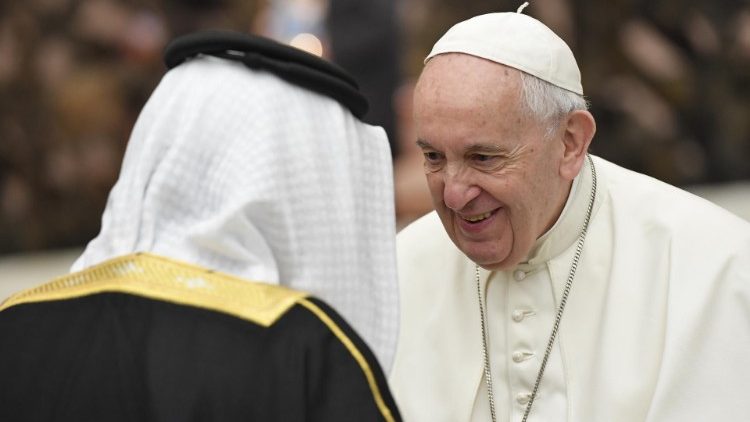
The Pope asks to pray for the Syrians and the Chinese
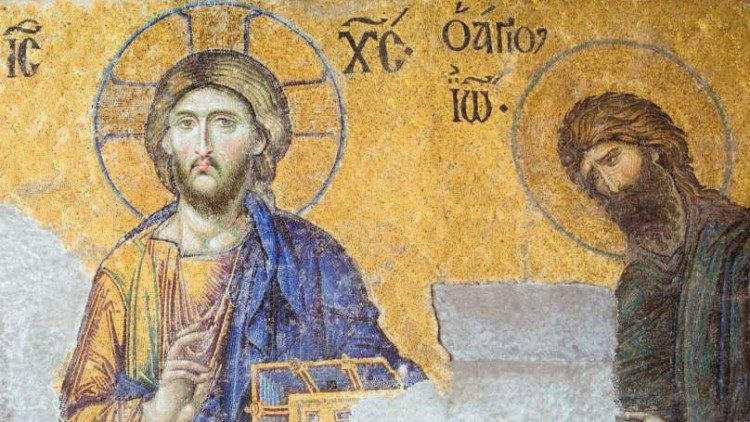
Spiritual Exercises: Listening to God is a Prophetic Experience
Most viewed:
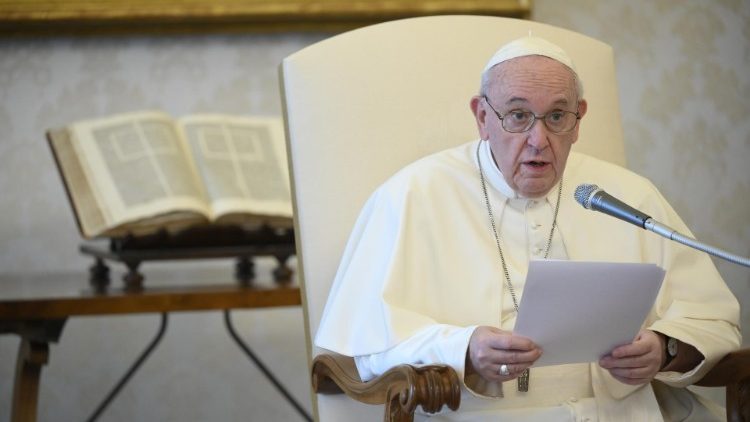
Pray is to make one's heart available for God's visit

Querida Amazonia, the Pope's Exhortation for a Church with an Amazonian Face

Spiritual Exercises: Listening to God is a Prophetic Experience
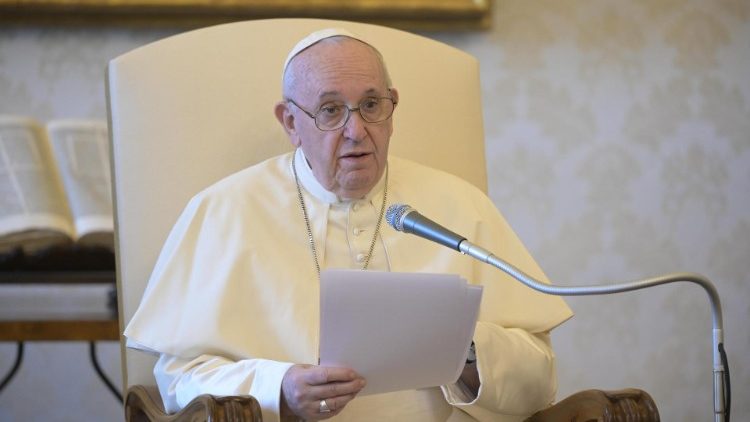
Pope at Audience: Recognize human dignity in every person
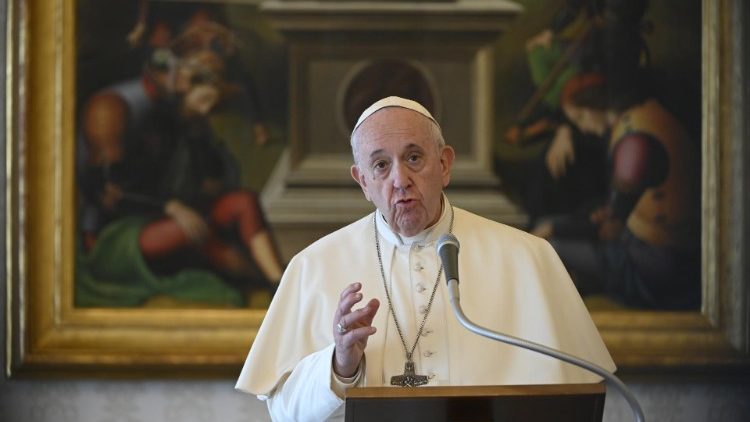
Pope proposes two prayer initiatives against coronavirus
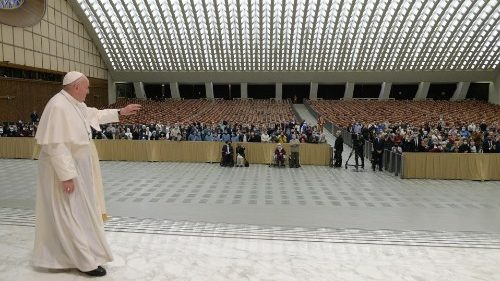
Pope Francis prays for victims of Cameroon school shooting

Baptism conferred with arbitrarily modified formulas is not valid
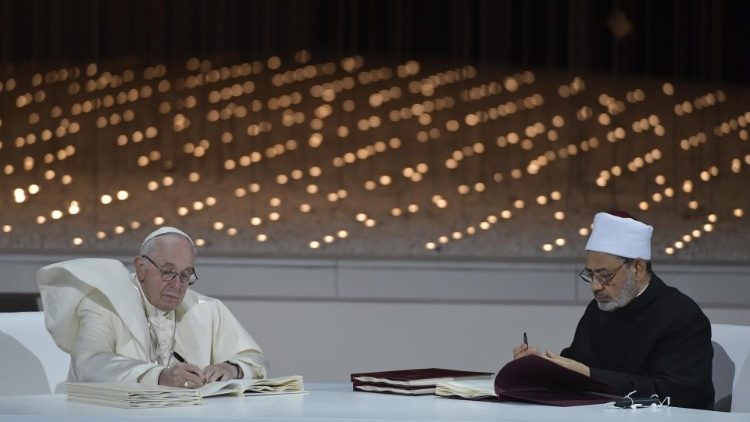
A year ago, the signing of the document on human brotherhood
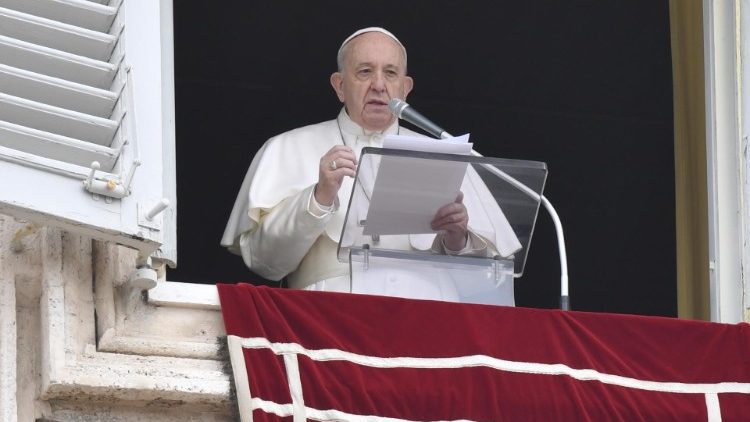
Never dialogue with temptation
